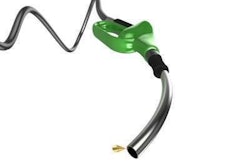At this week’s Government Fleet Expo & Conference in Austin, Texas, Roush Performance, CleanFuel USA and McCoy’s Lawn Equipment, with support from the Propane Education & Research Council, showcased on- and off-road propane-fueled vehicles that cut greenhouse gases.
The conference offered about 500 fleet and transportation managers the chance to get inside a propane-fueled Ford F-250 four-wheel drive pickup and a General Motors service truck, each equipped with a liquid propane injection system, and to inspect a zero-turn-radius Ferris propane-fueled lawnmower and a propane refueling dispenser.
Before the conference, PERC, a sponsor of the event, led a two-hour propane workshop on transportation uses for the clean and abundant fuel that is suited for fleet transportation markets. Other conference presentation topics included fuel conservation, green fleet programs and fleet replacement.
“City, county, state and federal fleet managers are looking for best-case scenarios for their transportation needs,” says Brian Feehan, vice president of PERC. “Propane-fueled vehicles offer a domestic solution that can help them reduce carbon emissions and fuel costs immediately.”
On average, propane fleet vehicles reduce greenhouse gas emissions by 17 percent and create 20 percent less nitrogen oxide, up to 60 percent less carbon monoxide, and fewer particulate emissions compared with gasoline. They also reduce operating costs.
Propane already is among the most widely used alternative fuels on roads today in the United States, powering 270,000 vehicles; worldwide, more than 13 million vehicles run on propane. According to the Energy Department, Texas is fourth in propane transportation fuel use, behind North Carolina, California and Michigan.










